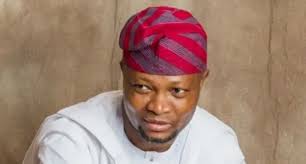Former Lagos State governorship candidate under the Peoples Democratic Party (PDP), Olajide Adediran, popularly known as Jandor, has weighed in on the internal issues that affected the PDP during the 2023 general elections. In a recent interview aired on Channels Television, Jandor said that the emergence of Atiku Abubakar as the PDP’s presidential candidate was not the main cause of the party’s failure but rather a symptom of a bigger problem—disunity and lack of party discipline.
Jandor, who has now returned to the ruling All Progressives Congress (APC), said that while the PDP prides itself on being democratic during internal selections, it often struggles with enforcing party supremacy and unity after decisions are made.
“PDP, give it to them, they can be very democratic when it comes to selection choices which is good… but PDP is the only party where I see leaders of the party telling followers ‘don’t vote for that microphone because it wasn’t my choice’,” he said during the interview.
He contrasted this with his experience in the APC, where party members are more likely to align with the party’s decisions regardless of personal preferences. According to him, once a candidate emerges in APC, the rest of the party leadership and structure rally around the candidate, a culture he says the PDP lacks.
Jandor argued that while Atiku Abubakar’s victory in the presidential primary was conducted fairly and openly, it did not receive full backing from the entire PDP structure. Some high-ranking members of the party reportedly distanced themselves or even worked against the party’s official candidate, weakening the PDP’s performance at the polls.
This internal resistance, he said, created confusion and disloyalty that discouraged grassroots supporters and divided votes, especially in strategic regions.
Jandor’s comments add to the ongoing debate within the PDP regarding the reasons for its recent electoral setbacks. Since losing the presidential election in 2023, the party has faced internal crises, defections, and regional disagreements, particularly over zoning and leadership direction.
His defection back to the APC, a party he left to contest under the PDP in the 2023 Lagos State governorship election, also highlights the political realignment taking place across the country as politicians position themselves ahead of the 2027 general elections.
Although Jandor’s bid for the Lagos governorship was unsuccessful, his political journey remains a subject of public interest. His recent remarks have been interpreted by political observers as both a critique of his former party and a subtle endorsement of the APC’s internal discipline.
In recent times, several PDP leaders and aspirants have raised concerns about the lack of cohesion within the party, especially after the emergence of Atiku as the party’s flagbearer. While some backed his candidacy, others, especially from the southern part of the country, called for a power shift to the South, arguing that the North had held the presidency for too long.
Jandor’s analysis suggests that it is not just the outcome of the primary that matters but how the party collectively rallies behind its candidate. Without unity and loyalty to party decisions, even the most democratically chosen candidate can struggle during general elections.
The PDP continues to face challenges as it tries to rebuild and position itself as a viable alternative to the ruling APC. Issues of leadership, zoning, loyalty, and internal democracy remain at the forefront of the party’s current debates.
As preparations for the next electoral cycle begin, the ability of Nigeria’s political parties to enforce internal unity and build consensus may prove just as important as the popularity of their candidates.
